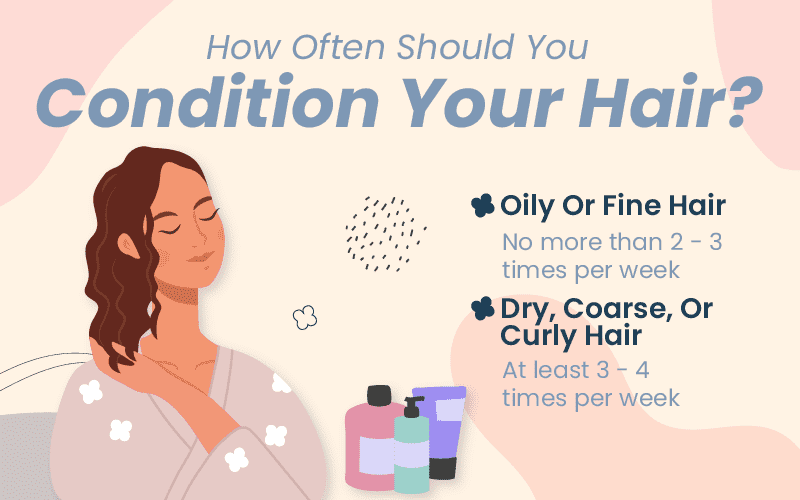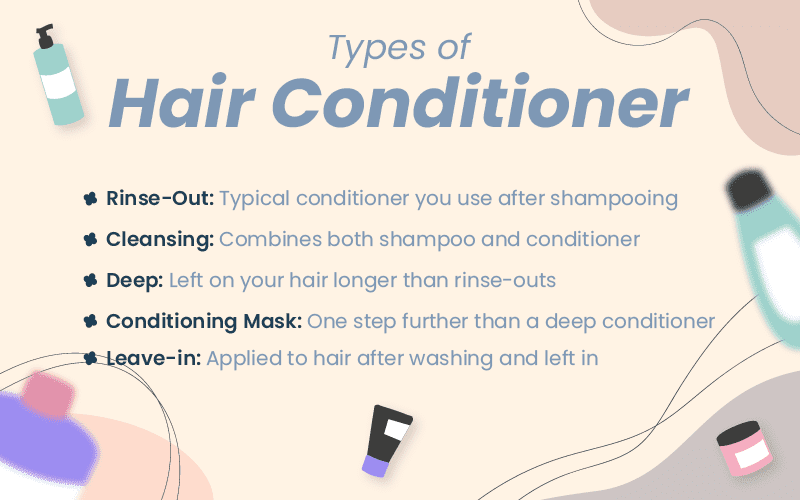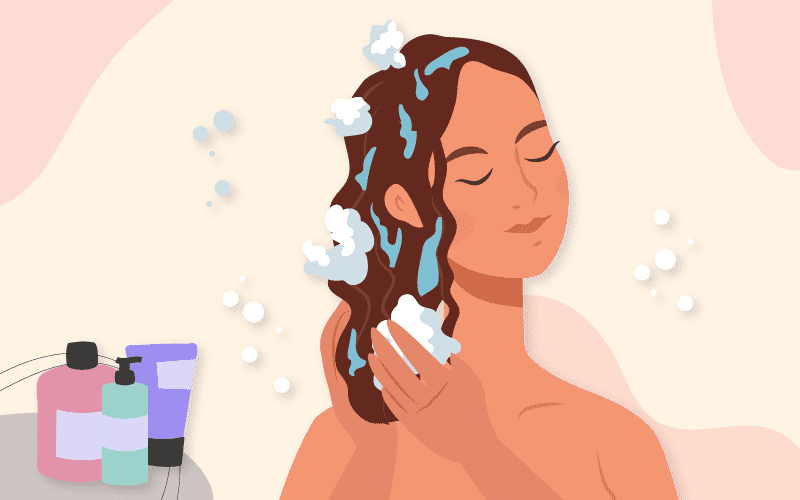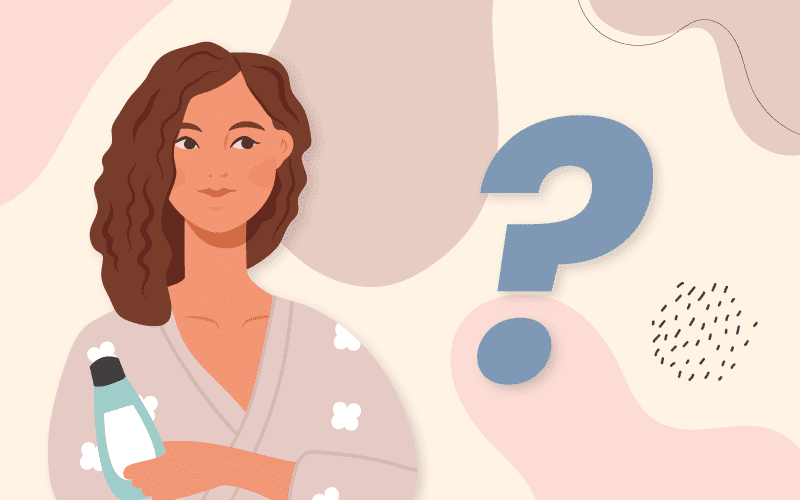Jump to:
We’ve all heard how important it is to condition your hair, but how often are we supposed to do it? And what exactly does conditioner do anyway?
The answer isn’t as simple as you might think and depends on several different factors. But first, let’s start with the basics.
Why Should You Condition Your Hair?

Conditioner is a moisturizing agent made from oils, silicones, emollients, and other soaps or detergents. It’s designed to replenish the moisture and smoothness of your hair that you lose after shampooing.
But how often should you condition your hair? That’s a question we’re asked frequently.
The Quick Answer
- Oily and Fine Hair: Light condition 2-3 times per week at most. Avoid leave-in conditioner, and only deep condition when necessary.
- Dry, Coarse, or Curly Hair: Condition every other day. Increase moisture with a deep conditioner or hair mask once per week or as necessary.
Experts note that repeated shampooing can extract between 70% to 90% of the lipids from your hair. Conditioning your hair prevents it from breaking by coating each follicle in a protective glaze and replenishing lipids.
But it’s a balance game. If you condition your hair too much, it can leave your hair feeling greasy, heavy, and dirtier than it was before you washed it. If you condition it too little, your hair can become dry, brittle, and unmanageable.
Finding the right balance for your hair time is crucial. Keep reading to learn how just how often you should condition hair.
Types of Hair Conditioner
Using both shampoo and conditioner is necessary to maintain healthy and manageable hair. The first step to determining how often you should condition your hair is finding out what type of conditioner you should be using.

Different conditioners are better for different hair types and textures. Below, we’ll cover what each type is and when to use each one.
Regular Rinse-Out Conditioner
Rinse out conditioner is the typical conditioner you use after shampooing, whether for colored, damaged, or curly hair. You only need to leave it in your hair for a minute or so, then wash it out. You should be using a rinse-out conditioner each time you wash your hair. The average person washes their hair a few times per week.
Studies have shown that there isn’t a significant difference between different types of rinse-out conditioners. Although some brands will work a lot better for you than others, knowing the difference between conditioner for color-treated hair versus uncolored hair or conditioner for curly hair versus straight hair is complex.
The two often use the same ingredients and market them differently for different hair types. Even though most conditioner brands are similar, specialty conditioners meant for more specific hair problems do exist.
These include products like chlorine conditioners. These conditioners contain a specialty formula to strip your hair of chlorine chemicals and replenish your natural oils.
Cleansing Conditioner
Cleansing conditioner is a type of conditioner and shampoo created to wash and moisturize your hair simultaneously. These are meant to be rinsed out after each use and make it so that you only need to use one product in the shower.
Because they have to clean and condition your hair, they are usually lighter and do not condition as deeply as using a conditioner by itself would. These conditioners don’t weigh your hair down, which is excellent, and they work great if you have oily hair.
You can use a cleansing conditioner as often as you need to wash your hair, whether that is every other day or once a week. If you have dry, curly, or coarse hair, you can go long periods between shampooing your hair, but it still needs to be conditioned more often than that.
If you have one of these hair types and only use the shampoo once or twice a week, you likely won’t want to try cleansing conditioners. You should have a regular rinse-out conditioner that you can use in between washes.
Deep Conditioner
Deep conditioners should be left on your hair a little bit longer than other conditioners, so they have time to penetrate deeply. You typically leave it on for 5 minutes while you are in the shower, and it leaves a thicker conditioned feeling to your hair.
If you have heavily damaged hair, using a deep conditioner once a week might help repair it faster. It will hydrate dehydrated hair and help get it back to health. If your hair is slightly dry but not heavily damaged, it’s wise to use a deep conditioner every month or two.
As someone who spends ample time in the ocean, I use a deep conditioner every week or every other week to keep my hair from getting dried out from the saltwater.
There’s no set rule on how often any person should use a conditioner. How often you use a conditioner depends on your circumstances and the different environmental stresses on your hair.
Conditioning Masks
Conditioning masks go even further on repairing your hair strands than a deep conditioner. These masks should stay on your hair for an hour or longer. They work to saturate the follicles with moisture.
These are only necessary to use when your hair needs a heavy pick-me-up. Every six months, I try to use a deep conditioning mask to reset my hair and keep it healthy and strong.
People with oily or fine hair will likely never need a conditioning mask since it will weigh it down and make it more oily than before. There are many different types of conditioning masks, and you can make many of them at home.
For example, I saturate my hair with coconut oil every few months and let it soak in for an hour before shampooing and conditioning my hair. This routine is a simple DIY way to apply a conditioning mask and lock moisture into your hair.
Leave-in Conditioner
Leave-in conditioner is just how it sounds. It’s the kind that you leave in your hair after you have gotten out of the shower. It’s meant to keep your hair soft and detangled until your next wash. This type works great for damaged hair, curly hair, dry hair, and other hair types that need some extra moisture throughout the week.
Apply leave-in conditioner directly after washing and conditioning your hair in the shower and reapply throughout the week as needed. If you’re going swimming or traveling to an arid climate, apply a leave-in conditioner before you go to help keep your hair happy and hydrated.
How Often to Condition Your Hair

Now that you know which kind of conditioner is best for your hair type, let’s discuss how often you should be conditioning your hair based on your hair type.
Oily Hair and Fine Hair
If you have fine or oily hair, you have probably experienced the feeling of weighed down, greasy hair after using conditioner. This phenomenon is common and means that you don’t need to condition your hair as often as other hair types.
Washing your hair a few times a week and following up with a light conditioner is usually a safe idea. You should be sure to rinse the conditioner out 100% before drying since any leftover residue will weigh you down. Your rinse game should last a couple of minutes to ensure you don’t leave any conditioner behind.
Usually, a leave-in conditioner isn’t necessary, and you should only use deep conditioning treatments when needed. Using a cleansing conditioner will wash and condition your hair simultaneously and is light, leaving your hair feeling clean and voluminous after showering.
Dry, Coarse, or Curly Hair
Dry and coarse hair needs frequent conditioning. If you have this hair type, you will likely need to condition it every other day. Adding a deep conditioner and conditioning masks into your routine will help your hair hydrated in between washes.
Shampoo strips the oils from your hair and will lead to dryer, more brittle hair. You want to limit the amount that you wash your hair if you have dry or coarse hair.
You’ll likely need to condition more than you wash your hair, too. If you shampoo once a week, condition your hair three times per week. If you wash your hair twice a week, condition your hair four times per week.
Things to Consider
Here are a few things to consider related to using conditioner:
- To avoid the feeling of a greasy scalp, use conditioner only on the shaft and ends of your hair and do not use it on the scalp.
- Similarly, to avoid drying out your hair thoroughly, use shampoo only near the scalp and not on the ends of your hair.
- Comb your hair out in the shower while the conditioner is in it for a smooth, easy brush later on and to help distribute the conditioner throughout your hair. Do not use a natural-bristle brush on wet hair.
- Rinse your hair out with cold water after conditioning to keep moisture locked in.
- Consider applying a deep conditioner and sleeping with it overnight to allow your hair to absorb the maximum amount.
- Start by applying conditioner to the tips of your hair and work it upward towards your scalp since the ends are typically the driest and most brittle.
Following these tips will help you maximize your hair conditioning experience.
Frequently Asked Questions

Now that you know all about conditioners, you might still have some questions. Here are the answers to some of the ones most frequently asked by our readers.
Are There Negatives to Conditioners?
Although there are very few negatives to using conditioners, some do exist. There’s potential for allergic reactions to different conditioners, in which case you should stop using them immediately and contact a physician.
Some conditioners cause people to break out on their face, back, and neck because of the excess oils. The biggest downside to these products is that conditioners can weigh down your hair and make it feel oily and gross.
How Much Conditioner Should You be Using?
Sometimes it’s difficult to know if you are using too much or too little conditioner on your hair. Luckily, some signs can clue you in on whether or not you need to cut back on or increase your conditioner use. Signs that you are using too much conditioner on your hair, that your conditioner is too heavy, or that you’re using too much product include:
- Hair feels greasy
- Hair appears flat
- Hair is too shiny
- Hair has no volume or buoyancy
- Hair is sticking to your head
Here are some signs that you might be conditioning too little:
- Hair is dry
- Hair is brittle, and you experience regular breakage
- Hair is tangly and hard to brush
- Hair appears dull
- Hair is frizzy
If this is the case, you are likely not conditioning your hair enough or using conditioners that are too light for your hair.
So, How Often Should You Condition Your Hair?
The amount that you should condition your hair depends on your hair! Now that you have read our guide, you should have a good idea of what conditioner you should be using and how often you should use it.
If you have oily or fine hair, you may want to condition it sparingly, but if you have dry, damaged, coarse, or curly hair, you may need to amp up your conditioner to get your hair healthy!
